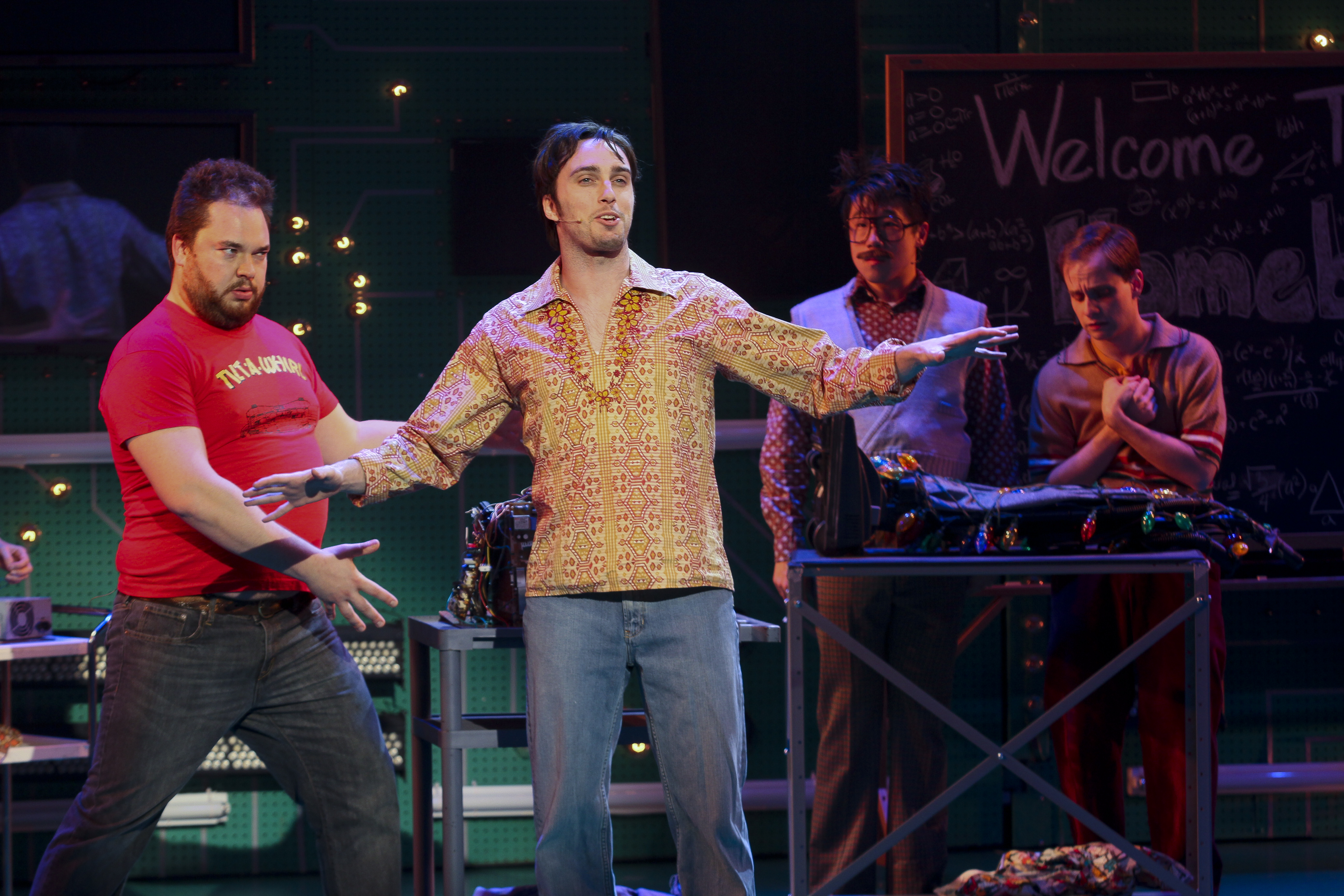
When Nerds opened in 2007 at the Philadelphia Theatre Company’s old home on Delancey Street, Microsoft and Bill Gates dominated the tech world and Steve Jobs was struggling. More than 90% of computers in the U.S. used Microsoft Windows; Apple commanded only 8% of the market.
So much has changed since then. In 2008, one year after the premiere of Nerds, Apple introduced the iPhone. Customers rushed to buy Apple’s iPod music player and iTunes and iPads. Young people flocked to hang out in all those hundreds of Apple stores. Then Steve Jobs developed pancreatic cancer and died in October 2011. So you might expect that this updated version of Nerds would be more serious, somber and reverential towards the deceased.
To the contrary, this re-worked show is more outrageous. The writers have exaggerated the character traits and the foibles of both Gates and Jobs. They clearly want to assure us that we’re watching a comic fantasy, not a documentary. The show amplifies every quirk that’s known about these two men.
Yes, it’s wacky and ridiculous. But that’s the formula that worked for The Book of Mormon and The Producers.
In the 2007 incarnation, Jobs was a foil for the triumphant Gates; he didn’t even have a song of his own. Now the two men are closely matched rivals. First one is on top, then the other. (Having been fired by Apple, Jobs sings, “Down and Out in Silicon Valley.”) As their relative fortunes ebb and flow, audience members are likely to root for whoever happens to be the underdog at any particular moment.
The script takes us back to 1975, when computers were the size of a city block and the only people who knew and cared about them were a group of nerds who gathered weekly in northern California for the competition of the Homebrew Computer Club, where the real Steve Jobs and his partner, Steve Wozniak, competed against Bill Gates and his friend Paul Allen. In the show, Gates confesses to his geekiness and sings how he was picked on by other children, while Jobs covers up his insecurities with bravado. He thrusts his hips like Elvis, struts like Mick Jagger and is stoned half the time.
Gates is meek and obsequious as he enters IBM’s corporate halls but he soon learns how to outsmart the president of that blueblood dinosaur. Girls flock to Jobs while they shun the maladroit Bill Gates. Jobs sells his computers with a narcissistic personal appeal: “The question is, Will I rock your world tonight? The answer is, Hell yes.” Gates, on the other hand, worms his way to power through patents, contracts and copying.
The show gives each of the inventors a fictional love life. Gates repeatedly muffs sports metaphors, indicating that he’s oblivious to the popular culture that dominates most men’s lives: “Dang, I thought we were gonna come in here and kick a grand slam dunk right into the goal.”
Jokes about computer lingo abound —- the expected double entendre about floppy discs, megabytes and hard drives, of course, as well as some words I hadn’t previously thought about, such as “daemon failure” and the color “cyan. It’s blue. Call it blue!”
A catchy addition to this production is a kick-step vaudeville song-and-dance, “A Step Ahead,” led by Tom Watson, the IBM chief executive. There’s sparkling choreography (by Joshua Bergasse) and more impressive scenery than before, making use of the greater height of the company’s new stage.
Toward the end comes a serious note when one character observes that the Internet has magnified the type of bullying to which Gates was subjected when he was young. Then it ends with Gates, Jobs and everyone else singing, “The kids that no one noticed/ The voices no one heard/ Oh, we are all just nerds.”
Happily, that’s the only serious scene. The rest of the show is screwball entertainment with catchy music.
Stanley Bohorek makes a convincing and touching Gates, and Matt Bradley is a charismatic sex symbol as Jobs. The supporting actors are superb: Rob Morrison, Benny Elledge, Briana Carlson-Goodman, Lexy Fridell, Kevin Pariseau, Blake Segal each contributing star turns.
Read other reviews on The Cultural Critic